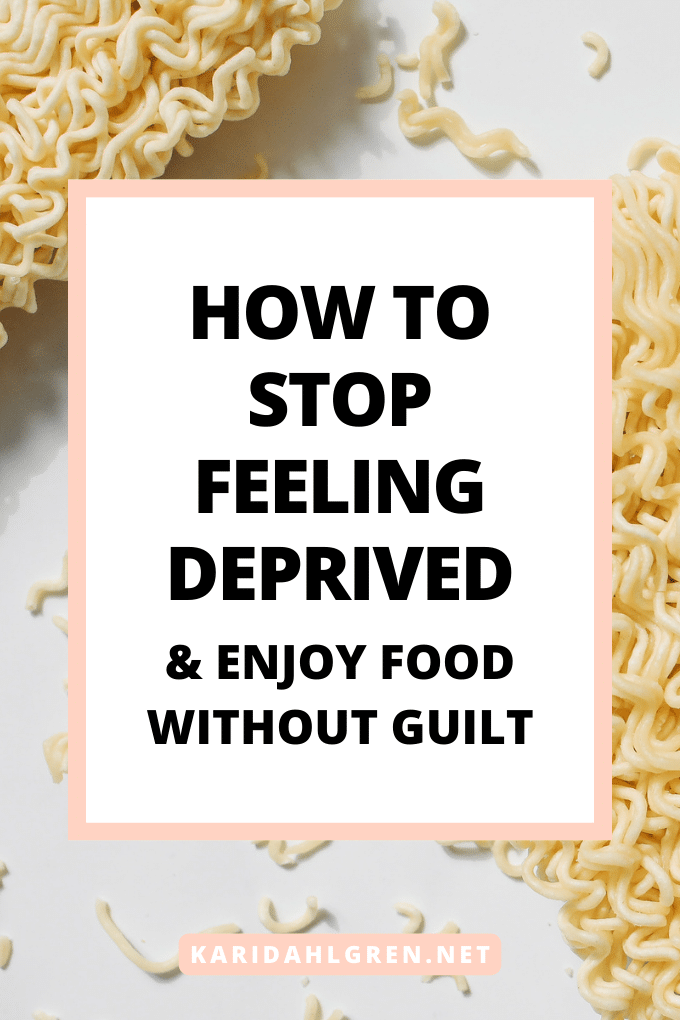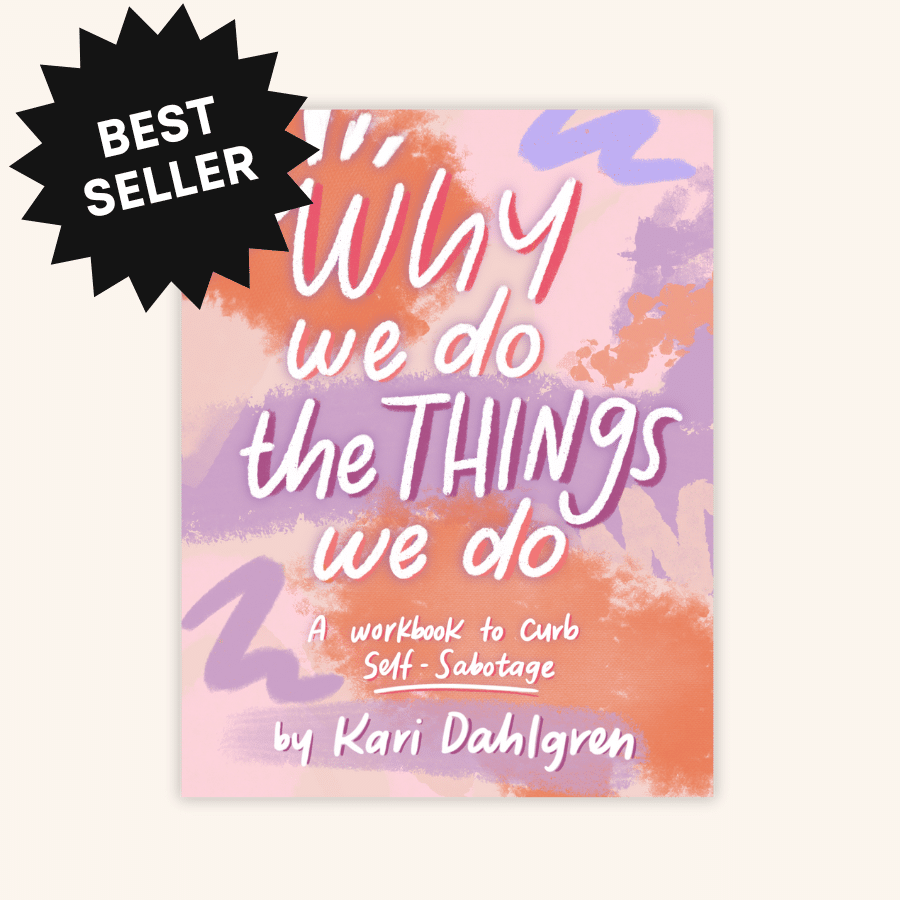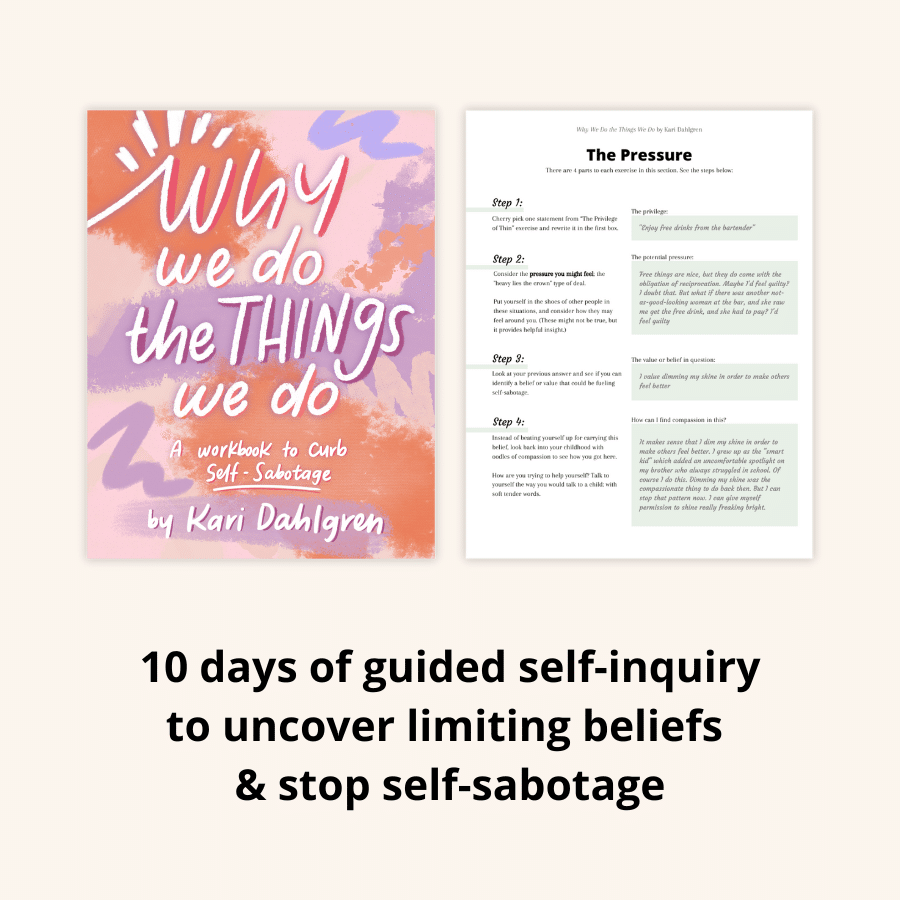
When certain foods are restricted, like sweets or carbs, it’s called selective food deprivation. The intention is usually better health or weight loss, but feelings of deprivation often backfire. For many, a resolution to avoid certain foods often leads to a cycle of restriction, deprivation, craving, and eventual out-of-control eating.
This pattern, commonly referred to as the restrict-binge cycle, leaves many of us feeling defeated. I can certainly attest to the frustration of compulsively eating an entire sleeve of cookies after a day of “successfully” limiting carbs and sugar—back before I gave up dieting and healed my own binge eating patterns.
As a wellness coach with a specialty in eating psychology and fluency navigating clinical literature, I created this evidence-based article to help you stop feeling deprived and get back to balanced, relaxed eating.
Are you ready to challenge the notion that dietary restriction leads to better health? Together, let’s discover how a more intuitive approach to eating enhances physical and psychological well-being, leading to a truly healthier lifestyle.
What Does Food Deprivation Mean?
This article aims to explore the road to recovery from selective food deprivation, where certain foods or overall calories are intentionally restricted. That said, it’s also important to understand food deprivation in general too.
There are several types of food deprivation that affect people in different ways, shaping how they relate to food:
Selective Food Deprivation
This occurs when someone chooses to cut down on their food intake, often influenced by diet trends or a desire to meet certain health or body image goals. It might seem like a way to take control, but selective food deprivation can actually lead to ignoring important signals from your body about hunger and health.
According to a study published in the journal Current Nutrition Reports, short-term selective food deprivation increases cravings, particularly for the avoided food.[1] In a frustrating turn of events, this works against the reason why many people restrain their eating to begin with: to feel in control of their cravings.
Involuntary Food Deprivation
Not all food deprivation is a choice. Many people experience it because of factors out of their control, like financial difficulties or lack of access to nutritious food, also known as food insecurity. These experiences can leave a lasting imprint, leading to behaviors in adulthood like hoarding food as a way to cope with past uncertainties or overeating to avoid food waste.
Emotional Food Deprivation
Sometimes, people eat more or less in response to their emotions rather than physical hunger. Whether it’s reaching for a snack when stressed or skipping meals when upset, these habits can develop into consistent patterns that disrupt a balanced diet.
By understanding the reasons why we deprive ourselves of beloved foods, we can be more compassionate and effective in how we address balanced, peaceful eating. It’s not just about what we eat, but also understanding why we eat the way we do.
Unraveling the Psychology of Feeling Deprived
The effect of selective food deprivation reveals some intriguing dynamics in eating psychology—namely, that humans often want what they can’t have. Let’s unpack some clinical evidence to illustrate how reverse psychology influences our eating habits and feelings of deprivation.
A study published in The Western Journal of Nursing Research showed that feelings of deprivation correlated with weight cycling and restrained eating.[2] In other words, the more someone felt deprived, the more likely they were to try and control their eating, albeit unsuccessfully by cyclically gaining and losing weight.
To make matters worse, the same study found that preoccupation with food was not significantly linked to actual caloric intake, which means that we can feel deprived regardless of how little or how much we’re actually eating.
Another study published in the journal Frontiers in Psychology showed that selective deprivation can significantly increase cravings when someone is specifically depriving themselves of a beloved food.[3] The study specifically looked at chocolate and how chocolate-lovers had stronger cravings when chocolate was restricted, even without restricting overall calories.
This “hedonic deprivation,” referring to the pleasure aspect of eating, increases cravings and shows that our response to food involves more than just physical hunger—it also includes our mental state and past experiences with food. Psychology indeed plays a strong role in our eating behaviors, warranting an approach to “normal eating” that goes beyond the superficial aspects of food.
Food Deprivation & The Restrict-Binge Cycle
These findings lead into the concept of the restrict-binge cycle, a common outcome of selective food deprivation. This cycle is characterized by periods of deprivation followed by episodes of excessive or out-of-control eating. This pattern is not just a matter of willpower—it is deeply rooted in the mind-body response to restriction and deprivation.
Biological Drivers of Feeling Deprived
Physically, when we restrict our food intake, especially over extended periods, our body initiates a series of biological responses aimed at survival. Hormones that trigger hunger and cravings for high-calorie foods increase, as the body seeks to replenish its energy reserves quickly. This biological push can make hyperpalatable foods (those high in fat, salt, and sugar) nearly irresistible.
For instance, a study published in The American Journal of Clinical Nutrition showed that after just three days of reducing food intake by 25% (e.g. consuming 1,500 calories per day for someone that normally requires 2,000) participants significantly increased their food intake.[4] This response highlights how restrictive diets can trigger a biological drive to overeat.
Psychological Drivers of Feeling Deprived
Psychologically, the restrict-binge cycle is equally compelling. Decades of research published in Frontiers in Nutrition have consistently shown that restrained eaters, or people imposing selective food deprivation, are more likely to overeat.[5] These individuals often report distress when their eating does not align with social norms or personal expectations, which can worsen the sense of being out of control and lead to further overeating.
Consequences of Selective Food Deprivation
Before we explore steps for breaking free from feeling deprived and working towards balanced eating, it helps to understand what’s at stake. By recognizing the consequences of selective food deprivation—whether it’s by making specific foods off-limits and/or limiting your overall calorie intake—it can help motivate behavior change.
Here are some potential consequences of selective food deprivation:
- Slow Metabolism: Selective food deprivation, particularly in the context of reducing overall calories consumed, causes metabolic slowing as the body tries to conserve energy. There is often a need to heal one’s metabolism after restrictive dieting to recover from the damaging effects of selective food deprivation.
- Increased Cravings: Despite popular belief that low-nutrient foods lead to poor health, a study published in The British Journal of Nutrition shows that low-nutrient foods can comprise up to one-fifth of your diet without harming overall nutrition.[6] Yet, in painful irony, placing rules and restrictions around low-nutrient foods actually increases the desire for them.
- Increased Body Weight Over Time: Selective food deprivation is correlated with weight cycling, or repeated cycles of gaining and losing weight. This can lead to a higher overall body weight over time, as explained through set point weight theory.
- Emotional Consequences: Different types of food deprivation can lead to significant emotional distress, including feelings of guilt about eating habits, shame over body image, and anxiety about breaking food rules. These feelings can exacerbate the restrict-binge cycle.
There are significant consequences of selective food deprivation, which can cause frustration for anyone seeking to improve their overall health. On one hand, limiting one’s intake of so-called “junk food” is frequently promoted as a health strategy, and yet an abundance of clinical evidence shows that this merely increases desire for the avoided food. Where do we go from here?
How to Get Back to Balanced, Intuitive Eating
As we peel back the layers of the restrict-binge cycle and the deep-rooted effects of selective food deprivation, it becomes clear that the path to true health involves moving away from rigid food rules. The highly adaptive body call for a more intuitive approach—one that honors our internal cues and celebrates food as a source of nourishment and joy, not just a numerical value to be managed.
Here are some helpful steps for breaking free from patterns of selective food deprivation and embracing a more balanced, intuitive style of eating:
Listen to Your Body’s Natural Signals
Intuitive eating involves listening to internal body cues of hunger and fullness instead of external food rules. Some people call intuitive eating the “hunger and fullness diet,” but it’s about more than internal body cues. Intuitive eating also promotes body acceptance and making behavior choices based on health as well as enjoyment.
A study published in The Journal of the Academy of Nutrition and Dietetics shows that intuitive eating not only improves physical and psychological health but also enhances body satisfaction and eating habits.[7] For chronic or fearful dieters, it’s a taller order to let go of the food rules overnight and eat solely based on internal body cues. If you struggle with a fear of weight gain with intuitive eating, my YouTube video helps address this anxiety.

Incorporate Previously Restricted Foods Slowly
As you begin to adopt a more intuitive, flexible approach to eating, you don’t have to do it all at once. Instead, gradually reintroduce foods that you’ve been avoiding or selectively restricting. For many people, this involves making peace with carbs and sweets.
Having permission to eat the foods you genuinely enjoy is an important element of balanced eating. A study published in PLoS (Public Library of Science) One strongly supports eating pleasure as a catalyst for healthy eating.[8] For many people, though, beloved foods often spark a fear of overeating. Know that it’s normal to feel apprehensive, and that all foods can have a place in a balanced diet.
When you include a variety of foods into your diet, it not only promotes optimal nutrition but also keeps meals exciting and satisfying—and satisfaction is another important element of healthy eating. Without satisfaction, feelings of deprivation continue to fuel the restrict-binge cycle.
Engage Fully with Your Meals
A great way to enhance meal satisfaction is to eat mindfully. When you eat, focus on the experience of eating—notice the tastes, textures, and aromas of your food. Mindful eating can help you appreciate meals more deeply and prevent overeating by making you more aware of your satiety cues.[9]
Also, when you eat foods that were once restricted, it helps to pay extra attention while enjoying these foods. Notice any extraneous emotions like guilt or fear that may crop up, and hold space for those emotions. They are a normal part of the process of deprogramming diet culture, and meeting difficult emotions with attention and compassion is a great way to move through them.
Empower Yourself Against Body Shame
One of the biggest reasons people deprive themselves of beloved foods is for the sake of weight loss. It can be difficult to separate self-worth from appearances in an image-centric culture.
In my experience as a wellness coach and someone living in recovery from compulsive eating, I’ve found that when you stop depriving yourself of beloved foods, you give the inner critic less fuel for self-critical thoughts. When there are less rules to break, there’s less to criticize.
I am not saying that it’s as simple as allowing all foods and suddenly feeling good about yourself. Rather, it’s about reducing the “airtime” that you give to self-criticism and turning the volume up on self-compassion.
The Journey From Feeling Deprived to Feeling Empowered
Selective food deprivation is often a well-intended effort to enhance physical health or lose weight, yet it often backfires by increasing desire for the avoided food. Letting go of the food rules is a great step towards diminishing the restrict-binge cycle.
Intuitive eating stands in stark contrast to restrained eating. It calls for abandoning external food rules and eating purely based on internal signals of hunger and fullness, while respecting health and enjoyment. When you stop feeling deprived of the foods you love, you take back a piece of personal power otherwise lost to diet culture.
I hope these tips help guide you towards a more peaceful, relaxed relationship with food—one marked by flexibility and joy. For a more personal guide to healing your relationship with food, see my free resources below. They’re an excellent next step forward.




Reading you articles makes me feel peaceful. I am tired of trying to follow diet rules. I needed your approach.
Thank you.
I love it, Valerie!! Feeling peaceful… feeling relaxed… these are very precious goals. Thanks for reading 🙂